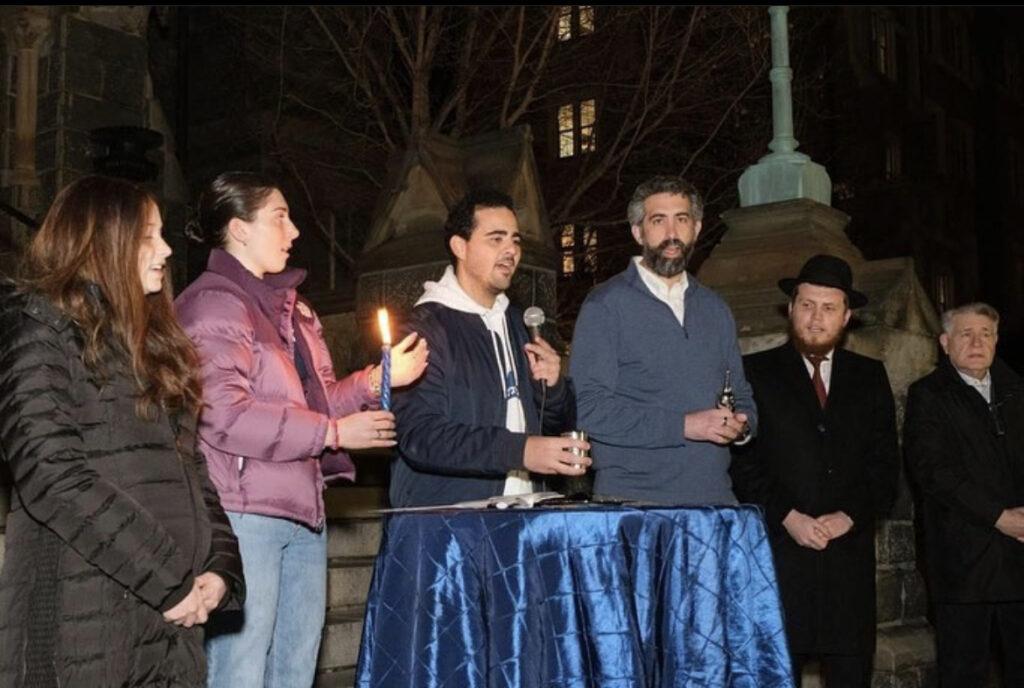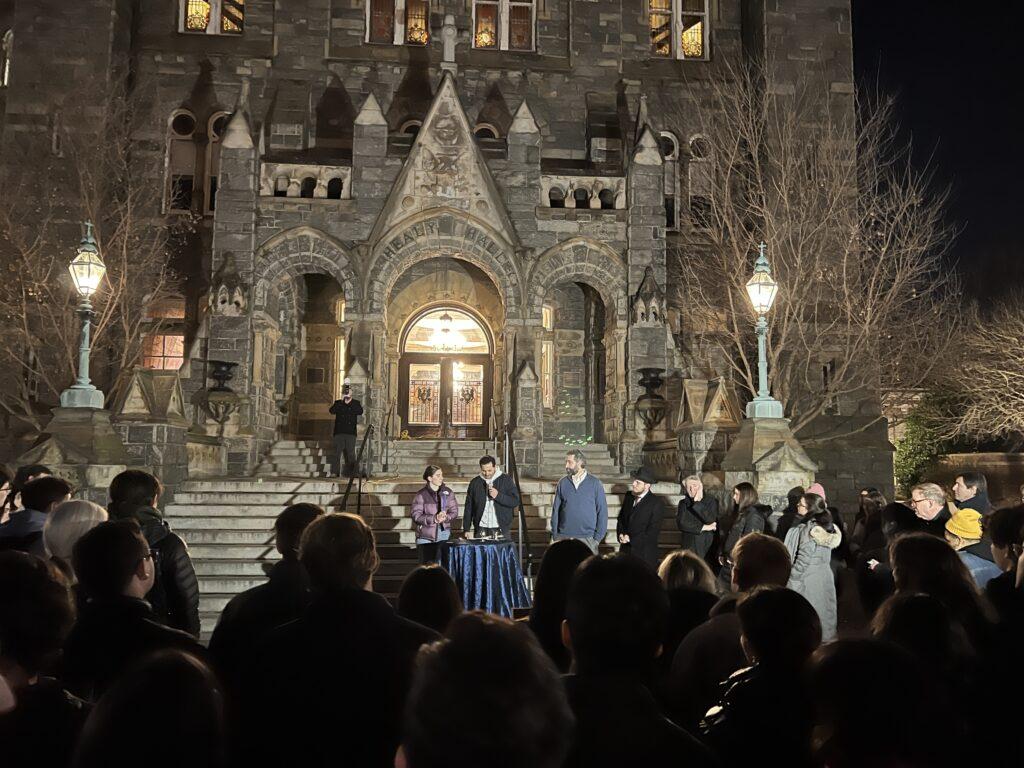CW: This article discusses antisemitism and violence against Jewish communities. Please refer to the end of the article for on- and off-campus resources.
The Jewish Student Association (JSA) invited the Georgetown community to Havdalah to stand in solidarity against recent incidents of antisemitism on campus.
Havdalah represents a new beginning to each week for those of the Jewish faith, and the Jan. 28 gathering of dozens of community members in front of Healy Hall served as an opportunity for Georgetown’s Jewish community to find comfort and safety after a string of antisemitic incidents on campus, including the discovery of a swastika drawn on a wall in first-year residence Darnall Hall.
The event featured remarks by JSA Co-President Chloe Schneider (CAS ’24) and speeches from Rabbi Menachem Shemtov and Rabbi Daniel Schaefer, the interim director for Jewish Life, about confronting difficulties with spirituality. JSA Co-President Joseph Abergel (CAS ’23) sang Havdalah blessings and passed around a ritual cup of grape juice, a substitute for the traditional wine, to end the ceremony.
The event emphasized the importance of finding solace in community amid times of struggle, Shemtov said.
“Shabbat is a time and uplifting time with a community of spirituality of sitting together, enjoying the moment of being in touch with ourselves as a community,” Shemtov said at the event. “We’re taking a special idea of survival, taking the inspiration of the warmth and trying to infuse that in the week ahead and the community around us.”
Abergel said he received a lot of positive feedback about the ceremony and felt encouraged after seeing so many people show up to celebrate their Jewish identity.
“The Havdalah was a reminder that there is a thriving and functional Jewish community that will always stand up for each other, in good times and in bad times,” Abergel wrote to The Hoya.
Schaefer said he appreciated the large show of support from the Georgetown community at the gathering, especially from those who are not Jewish.
“It’s amazing to see so many people here tonight for a distinctively Jewish ritual to be proudly Jewish, again in support and solidarity with Jewish people who want to live freely, proudly and without fear,” Schaefer said at the event.
Mrudula Chodavarapu (MSB ’26), who does not identify as Jewish, said she attended to show solidarity with the Jewish community on campus.
“I attended Havdalah because the recent antisemitic acts on campus are atrocious,” Chodavarapu said. “Havdalah was a beautiful experience. It was multisensory and immensely immersive.”

The location of the ceremony added to the feeling of solidarity as a community, according to Sasha Sebag-Montefiore (CAS ’25).
“Havdalah took place in front of Healy Hall, the nucleus of Georgetown University, where hundreds of students everyday pass by,” Sebag-Montefiore wrote to The Hoya. “By doing this, not only the Jewish Community, but all those who condemn racism and hate, we’re obviously and tangibly showing our love for each other and the strength we have together.”
Naomi Gould (CAS ’26), a JSA first-year representative, said she felt the support of the Georgetown community tangibly at Havdalah.
“Knowing that people were willing to take time out of their weekends to show solidarity for the Jewish community on campus means a lot because — as was mentioned by Joseph and Rabbi Daniel — standing together in strength is the only way we’re going to be able to combat all forms of bigotry,” Gould wrote to The Hoya. “I had non-Jewish friends physically standing with me at the ceremony after being there for me all week, and it was really uplifting to have their support.”
Antisemitism incidents on college campuses peaked in the 2020-2021 academic year when 244 incidents took place, according to the Anti-Defamation League, a nongovernmental organization fighting against antisemitism and bias. As of 2022, 85% of Americans believed in at least one anti-Jewish trope, which is 24% higher than rates measured in 2019.
Gould said she was grateful for everyone who attended Havdalah and that similar small acts of solidarity, including educating oneself about Jewish history, are vital for creating a safer and more inclusive community.
“Jewish students on campus, if they’re not actively feeling uncomfortable or unsafe being openly Jewish, are often put in situations where they’re forced to explain their identity to others to combat inaccurate stereotypes or be treated like any other student,” Gould wrote. “If every Georgetown student read one book, one article, took one trip to the Holocaust Museum, or even just read through one infographic on Instagram shared by a Jewish peer it would help alleviate that burden at least a little.”
Resources: On-campus resources include Health Education Services (202-687-8949) and Counseling and Psychiatric Service (202-687-7080); to report an incident of hate or bias on campus, refer to the Georgetown University Bias Reporting website. In the event of an emergency, dial 911. To report a hate crime, contact the MPD Hate Crimes Voicemail (202) 727-0500 or the Hate Crimes Coordinator ([email protected]).





















